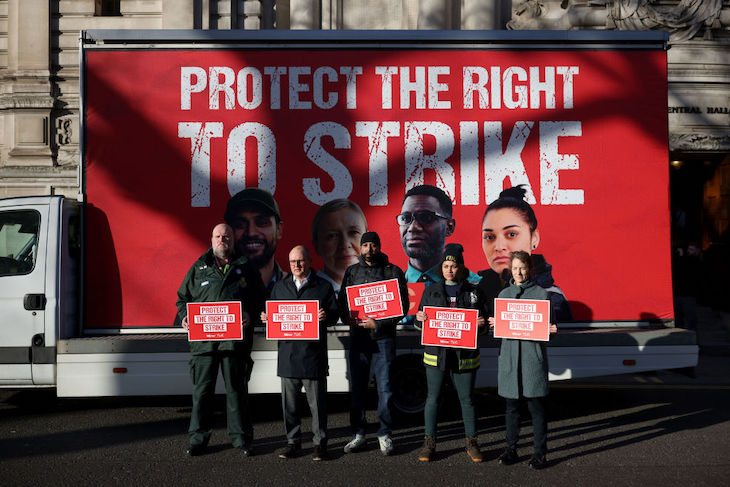The Trades Union Congress (TUC) has vowed to report the government to the UN workers’ rights watchdog over its controversial strikes bill, but how seriously can we take this threat?
The TUC’s leader, Paul Nowak, certainly sounds like a man on a mission: earlier this year, Nowak claimed the legislation was ‘almost certainly illegal’, a curious assertion given it was going through parliament at the time. Now that the bill has received royal assent, it appears the TUC is doubling down on its war on the strikes bill. Yet it’s hard not to see the TUC’s complaint as anything other than a stunt designed to further denigrate the Tories who, to the union’s mind, have spent 13 years wickedly chipping away at workers’ rights.
Given this legislation, if properly implemented, could lessen the impact of strikes and thus a union’s grip, it’s no great surprise that the TUC opposes it. The strikes bill will impose a minimum level of service during industrial action across a range of key public sector services. It empowers ministers, following consultation with interested parties (including unions), to issue a ‘work notice’ identifying individuals required to work during a walkout.
The idea that the Tories have eroded workers’ rights is wholly detached from reality
Many people support this legislation. A poll at the beginning of the year revealed that voters backed the strikes bill by 56 to 31 per cent. Public support for strikes may have remained reasonably consistent over 2023, but for how much longer will we revere doctors, when teachers and nurses and paramedics have all accepted the government’s pay offers? Back in July, just 37 per cent of voters supported train driver walkouts; a figure that will surely decline further as the public tires of the inconvenience they cause?
The TUC certainly look like they’re on shaky ground in opposing the Tories’ crackdown. But this isn’t the first time the TUC has picked what looks like a losing battle: in 2016, when the government pushed through legislation requiring that strike ballots in important public services meet a threshold of 40 per cent of eligible members voting in favour, the union considered that this breached the International Labour Organisation’s (ILO’s) declaration of Fundamental Principles and Rights at Work, to which the UK is a signatory. The ILO refused to accept the argument then, and is very likely to do the same now.
But the unlikely prospect of knocking down the strikes bill hasn’t put off the Labour party in jumping on the bandwagon either: in January, deputy leader Angela Rayner promised her party would repeal the bill, describing it as one of the most ‘indefensible and foolish pieces of legislation to come before this House in modern times.’
Unions, civil liberties groups, peers and other MPs have parroted these lines. The shadow levelling up secretary has today vowed to bolster trade unions, presumably as part of Labour’s wider plot to expand ever further workers’ rights with little consideration of the consequences. It is Panglossian to imagine that we can continually raise salaries of public sector employees while tirelessly strengthening their protections without someone, somewhere, bearing the cost.
The ‘right to strike’ is viewed as sacrosanct by many on the left, but it has frequently been qualified, as it is in all countries. It dates back to the 1906 Trade Disputes Act, which gave unions immunity from being sued for contract breaches. Back then, virtually all strikes were in the private sector. There were no minimum wage laws, no paid holidays, no Working Time Directives. Now, industrial action takes place almost exclusively in the public sector, where worker salaries are funded by the very same people these strikes will punish.
Nowak, who has been a union activist since the age of 17, has claimed the bill ‘falls far short’ of international legal standards. This is difficult to square with similar laws which operate in countries including France, Spain and Italy. The UK isn’t an outlier: in Germany, civil servants (including university staff and many school teachers) are banned from striking. In Slovakia, fire and rescue workers, air traffic controllers, health workers and various others are prohibited from strike action. In Britain, police officers have been banned from striking since the passage of the Police Act 1919. Unionisation is illegal for the Armed Forces.
There probably is a role for the TUC in modern British life, but attempting to occupy the same ground as the late RMT leader Bob Crow isn’t it. The idea that the Tories have eroded workers’ rights is wholly detached from reality. When Theresa May pledged in 2017 to turn the Conservative party into the workers’ party, she was too late: David Cameron had already done much of the work for her. The 2010s saw a vast expansion of labour market regulation, with the introduction of the Apprenticeship Levy and auto-enrolment in pension schemes, the hiking of the minimum wage and retention of IR35; the list goes on.
The real issue with the strikes bill then isn’t the legality, it’s the challenge of implementation: reaching acceptable service levels will be a logistical nightmare. And the problem with the government’s response to industrial action isn’t that it goes too far, it’s that it may not go far enough.
Next month, ‘unprecedented’ four-day joint action by senior and junior doctors in pursuit of a 35 per cent pay rise will be taking place. Forget minimum service levels: isn’t it time the government considered banning emergency services strikes altogether?






Comments